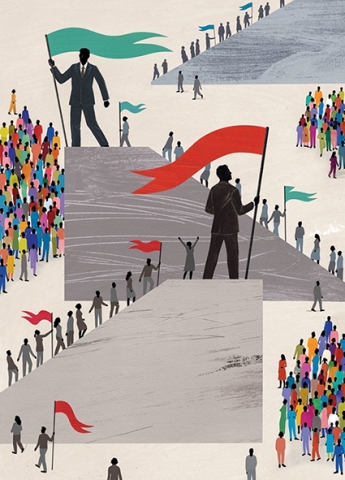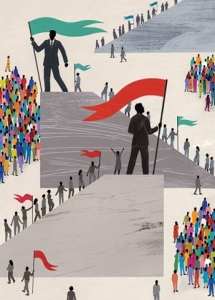The Aberrant Shades of Contemporary Leadership: a Crash Course
Historians often approach various facts or developments on the basis of ‘what if?’, and this is indeed a very helpful entry point when trying to find out whether something might have happened differently. By the same token, what if a Nobel Prize were to recognize the winner of the rather tricky and awkward accolade of ‘Political Craftsman/Leader of the Year’? One could easily imagine the members of the jury trying to bring some order to a multitude of conflicting criteria before casting their lot for this ‘Political Oscar’. This would be a truly challenging quiz in which the many different ‘known unknowns’ of distorted values and twisted realities (in fancy terms: ‘faked news’) and heavy betting and hedging on political pros and cons would make it almost impossible to discern a true state of affairs (let alone genuine and pure intentions). The apparently easy Cold War dichotomy of ‘evil vanquished by good’ has not simply vanished, but has instead splintered into various overlapping and frequently confusing shades of political leadership.
Even more noteworthy is the fact that, with economies becoming increasingly digital and artificial intelligence growing ever more assertive, the real place of the human factor in governance, far from being curtailed, has instead gained new meaning and significance. With the ability to leverage a veritable plethora of political weaponry and social media on an unprecedented scale, that meaning is on the brink of being able to either turn events into a complete policy-making glitch, or to drive people towards conquering the new heights of a quality-driven society. Most importantly, however, in an upside-down world the ‘new normals’ of political transactions (often behind our backs) gives special meaning to the process by which we anoint politicians to run our society and its politics. Typical of the pressing issues that need to be addressed are the questions of how we entrust them with decisive powers, and whether proper ‘watchdogs’ are in place and capable of not only watching but also ‘barking’ to draw our attention to aberrations of governance? While constitutional checks and balances matter a lot, and all possible seeds of grass-roots democracy should of course be emphasized, the mindsets of powerful politicians remain a critical factor, along with their past form when reflecting upon domestic and global affairs. Indeed, even in the era of digitalization and artificial intelligence, the actions of leaders will continue to play a decisive role for many decades to come, and therefore this is where a critical, timely and demanding analysis comes into play. Leadership matters, but what kind of leadership matters most and suits best?
Strongman as the Opposite of Leader
When he made a series of bold statements in his book The End of History and the Last Man back in 1992, neither Francis Fukuyama nor any contemporary scholars could have predicted how dramatically democracy would slide over the next 25 years or so. With the end of the Cold War and its proxy wars, many expected that humanity would finally witness a steep rise in democratic values and prosperity. This did happen to some extent: authoritarianism, for example, descended from its peak of 75 percent in the late 1970s to under 50 percent in 2000. And so where is the real problem that is confronting us? Why is that now-moribund forecast of greater democracy being substituted by authoritarianism? The bottom line when seeking to clearly distinguish ‘true’ democracy and ‘outright’ authoritarianism is becoming blurred. This should hardly be surprising since all-out rogue regimes are becoming increasingly unattractive and a liability to their leaders; yet on the other hand, democratic regimes (as we usually call them at face value) are struggling with an unprecedented array of challenges both foreign and domestic. Consequently, there is a striking and dubious convergence between authoritarians masking their true identity behind a patchwork of democratic ‘deal-making’ at home and abroad, and democratic (read: liberal) regimes resorting to the strongman’s toolkit to address crises of welfare, public services and national and global identity. This convergence is already producing a new type of governance, one which in some parts of the world goes by the name ‘illiberal democracy’ and in others by that of ‘sovereign democracy’, but in every case there are certain features that are essential to all these shades and categories and are mostly related to the need to align respective policies, since ‘whosoever desires constant success must change his conduct with the times’ (Machiavelli).
There are many unsettling examples of this new breed of strongman: Recep Tayyip Erdogan in Turkey, Rodrigo Duterte in the Philippines, Vladimir Putin in Russia. Different geographies, different cultural contexts and different ethnic and historical pretexts. Yet nearly all of them share an attempt to appear ‘smarter’ than overtly authoritarian—e.g. by maintaining pseudo-democratic institutions in place; by mimicking rules-based processes for their own domestic consumption needs; and by shielding their regimes from unwelcome components of democratic rule such as accountability, competition and representative government (to name but a few). Besides, this also ostensibly helps the strongman regime to sell a positive image abroad. But the new clout strongmen obtain by presenting themselves as rebranded democratic leaders is not only nefarious on the domestic stage: it also poisons the global perception of healthy democracy and liberty, and introduces a sense of false liberalism by presenting as normal what has long being conceived as abnormal—and, hence, treacherous. Strongmanship, however, is not the sole, all-encompassing form of an outright false democracy gravitating towards authoritarianism, and it is reflected in various other categories such as populism or ‘madman leadership’, all of which are conspicuous in different parts of the world.
Populism on the Rise
Migration crises, rising inequality, disillusionment with the moral authority of states and the global liberal order—all are solidifying anew the centuries-old merchandise that is populism. With the delicate modern algorithm of the will of the people vs. a decaying and dysfunctional or non-existent democracy, populism calls for preserving voters' interests even if doing so runs against the basic principles and values of liberal democracy (e.g. referendums to curtail minority rights or tasking the state with censoring freedom of speech). Following the examples of Orban in Hungary, some Central American leaders or mainstream Western European nationalist parties, populism purports to scorn liberal norms through the oversimplified model of backing a charismatic leader who promises salvation. But the promises of a savior are not always enough, and the people must be maintained in a constant state of alarm by finding enemies abroad or, as in the case of ‘reinventing’ a new Europe, by speaking of a ‘Europe of sovereign nations’ and thereby masking an inability to address social and economic challenges from within. In fact, populism may itself be the shortest and most efficient way to gallop towards dictatorship: when the residual legacy of democracy is finally dealt a mortal blow and when a populist leader is firmly in place, dislodging him through democratic means becomes extremely difficult.
Madman Brinkmanship
Unpredictability is the mark of the madman theory of running a nation (and beyond). With roots as ancient as Machiavelli's statement that ‘at times it is a very wise thing to simulate madness’, the real return of madman leadership to the global political stage may rightly be attributed to the Nixon era. Since then, ‘irrational rationality’ is clearly the signature of Trump’s presidency, the latter believing that bluffing is the best way for a strong leader to efficiently run affairs. Trump-like unpredictability does have its defenders, however, who argue that it allows for a fresh look at things and healthy debate on pressing matters; but such attempts to justify oddities in leadership are highly questionable, and the irony of the madman theory is that it failed to work for Nixon and will most probably fail to work for Trump. Most importantly, this brooding over game theory leaves a multitude of humiliating and sometimes dangerous questions (e.g. the North Korea ‘love letters’ fiasco, or the recent appeal to recognize Israel's sovereignty over the Golan Heights) to the consistency and inviolability of international law and order.
Georgia's Own Way of Leadership?
Domestic governance matters inasmuch as it affects a country’s international performance. This is particularly true when ‘the sands are shifting’ and when the goals and objectives of major global stakeholders become blurred (if not mixed and confusing). Hedging on Georgia's national interests when transacting regionally and internationally therefore poses a profound risk of making the mistakes and miscalculation that are always present in international matters. Even more importantly, one must remember that, given the volatility of influencing factors, sticking to dogmatic classics of ‘how to run a country’ is dangerous, as it deprives our small nation of vital adaptability and freedom of action. Following the orthodoxies of policy-making is never a bad thing, but we need our own Georgian mode of governance if we are to navigate the world successfully, and notably a new, bespoke type of knowledge-based stewardship and leadership. The latter would incorporate the necessary ingredients of representative democracy and, most importantly, would enable the country to develop during the stormy decades that lie ahead. Essentially, knowledge-based government would allow us to make the informed decisions we need in order to invest our resources into building competitive and sophisticated state and civic structures.
By Victor Kipiani
Image by Aude Van Ryn












